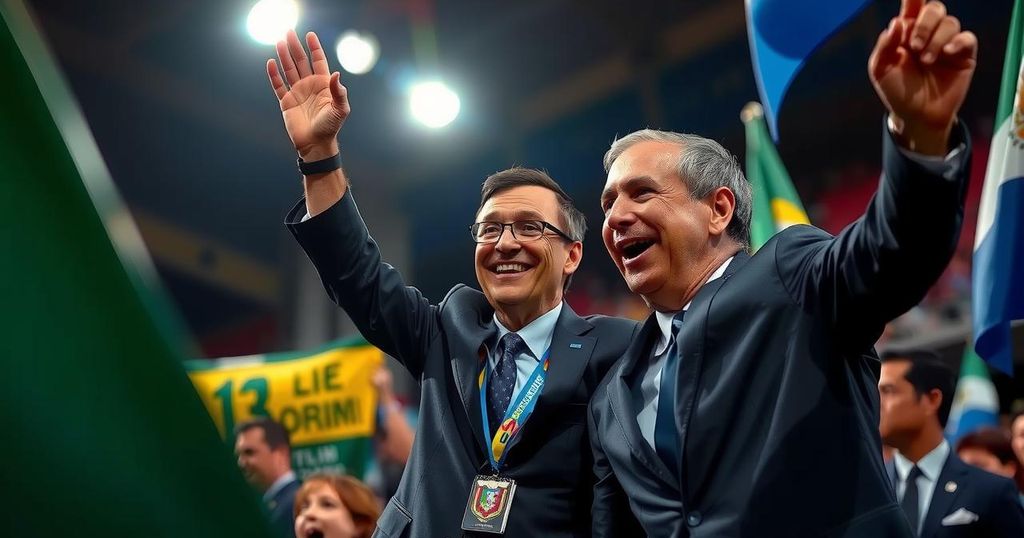Yamandú Orsi Secures Victory in Uruguay’s Presidential Election
Yamandú Orsi wins Uruguay’s presidential election, defeating Álvaro Delgado in a closely contested runoff. With over 49% of the vote, Orsi’s triumph signals a significant change in leadership amid global trends of anti-incumbent sentiments. His platform focuses on unity and moderate reforms, while the outgoing president concedes gracefully, ensuring a smooth transition as Orsi prepares to take office on March 1, 2025.
In a closely contested runoff election, Yamandú Orsi, a left-wing opposition candidate, was declared the winner, defeating the conservative ruling coalition in Uruguay. This result signifies a shift in leadership for the nation and poses challenges for incumbent parties worldwide. Álvaro Delgado, the conservative candidate, conceded, acknowledging Orsi’s win with grace. Orsi, a 57-year-old former history teacher and two-time mayor from the Broad Front coalition, celebrated with supporters, emphasizing unity among Uruguay’s citizens and recognizing the need for collaboration amidst diverse political sentiments.
With nearly complete vote counts showcasing Orsi receiving just over 49% against Delgado’s 46%, the voter turnout was notably high at 90%, due to the country’s mandatory voting laws. While younger voters exhibited some disinterest, Uruguay managed to sidestep the populist trends prevalent in other nations such as Argentina and the United States during this election cycle. Outgoing President Luis Lacalle Pou, who could not run for consecutive terms, conveyed his congratulations to Orsi via social media, indicating readiness for a smooth transition.
This election results partly stemmed from public economic dissatisfaction amid ongoing post-pandemic challenges, contributing to a notable global trend of anti-incumbent voting. While Orsi’s agenda merges market-friendly initiatives with social welfare policies, it draws inspiration from the Broad Front’s previous administration, noted for its progressive reforms from 2005 to 2020. Notable past successes include the legalization of abortion, same-sex marriage, and marijuana sales, achievements supported by former President José “Pepe” Mujica. Orsi has articulated plans for targeted reforms to stimulate investment and agriculture, alongside adjustments to social security.
The incoming president is anticipated to reassess a proposed trade deal with China, which could influence relations within the Mercosur trading bloc. Despite Delgado’s campaign promoting continuity of pro-business policies, citizens’ concerns about slow wage growth and rising crime rates overshadowed positive economic forecasts. In his victory remarks, Orsi projected an inclusive leadership style, expressing his intention to foster dialogue and inclusiveness within society. He is set to officially assume the presidency on March 1, 2025.
The article discusses the significant electoral victory of Yamandú Orsi in Uruguay’s presidential election, illustrating a broader trend of leftist successes in global elections against incumbent parties. It outlines the socio-economic backdrop influencing voter sentiment, revealing dissatisfaction among citizens following economic challenges in the post-pandemic landscape. The article captures Orsi’s political approach, highlighting his connection to previous social reforms, and aims to offer insights into the implications of his victory for Uruguay’s future.
In summary, Yamandú Orsi’s victory in Uruguay’s presidential election represents not only a win for the left but also reflects a larger trend of voter dissatisfaction with incumbent administrations worldwide. With a commitment to unity and progressive reforms, Orsi aims to address key economic challenges and enhance social welfare policies. His upcoming administration may reshape both domestic policies and international trade relations, especially concerning negotiations with China.
Original Source: indianexpress.com




Post Comment